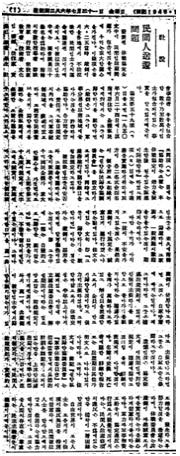Name: admin
2014-01-02 10:51:06 | Hit 1618
The Issue of Civilian Repatriation
Jul. 31st 1953, 1st page, Dong-a Daily
We are very interested in the fact that the civilian repatriation issue has been included in the final version of the Armistice Agreement. This is because the provision is related with the fate of those civilian public figures who were illegally abducted by enemy forces in Seoul during the Korean War. This is also because those abducted include approximately 30 National Assemblymen, and thousands of South Korea’s outstanding social leaders, including politicians, administrators, religious men, educators, engineers, writers, doctors, lawyers, businessmen, academics, students and social workers.
According to paragraph 59 of the agreement, “All civilians who, at the time this Armistice Agreement become effective, are in territory under the military control of the Commander-in-Chief, United Nations Command, and who, on 24 June 1950, resided north of the Military Demarcation Line established in this Armistice Agreement shall, if they desire to return home, be permitted and assisted by the Commander-in-Chief, United Nations Command, to return to the area north of the military Demarcation Line.” The same paragraph states that, “The Commander of each side shall be responsible for publicizing widely throughout the territory under his military control the contents of the provisions of this Sub-paragraph, and for calling upon the appropriate civil authorities to give necessary guidance and assistance to all such civilians who desire to return home.
It further states that, “Measures to assist in the return of civilians provided for in Sub-paragraph 59 (a) hereof and the movement of civilians provided for in Sub-paragraph 59 (b) hereof shall be commenced by both sides as soon as possible after this Armistice Agreement becomes effective.” The paragraph also calls for the establishment of a Committee for Assisting the Return of Displaced Civilians to be composed of four officers of field grade from each side. The detailed duties of this Committee are also included in this paragraph.
The safety and fate of the abductees has been a major point of concern for both their families and the people of South Korea. If what is prescribed in paragraph 59 above is carried out in a sincere manner, the abductees will soon find themselves repatriated back to South Korea and into the arms of their family and compatriots in no time. For such reasons, armistice talks has been prolonged over 6 months, they will expose themselves their self-repugnance.
We are concerned over whether the communist side will act sincerely in carrying out what has been prescribed in paragraph 59 of the Armistice Agreement. The paragraph includes the phrase “if they desire repatriation” which could be used for evil purposes by the enemy side, and could lead to a situation where the communist attempt to illegally detain abductees by saying they “do not desire repatriation.” If they do use this pretext, however, they will only be contradicting themselves. This is because they argued during the POW repatriation negotiations that there are no POWs who do not want to return home. They also sent a messenger who argued strongly that all POWs must be repatriated. For such reasons, armistice talks has been prolonged over 6 months.
Ultimately, the North Koreans have called for all sorts of unreasonable supplemental clauses like for the establishment of a “neutral country repatriation committee” or a “period of guidance.” If they argue that some abductees do not want to return home they will expose their self contradiction.
Unfortunately, in the articles of armistice agreement, the issue of civilian abductees is not fully (in detail) stipulated just like the one of POWs. Detailed reports on the list’s exchanges and the dead or the date of repatriation have not been recorded.
However, to the extent that the Committee for Helping the Return of Displaced Civilians has been tasked with forming a specific plan under the leadership and guidance of the Military Armistice Commitee, they should stipulate clear terms as detail as those of aforementioned exchanging POWs, as soon as possible.
We hope that the detailed agreements on POW repatriation are quickly passed and that effort is taken for them to have real impact in moving forward civilian repatriations. The armistice committee must be very watchful to whether the communist side sincerely takes action on this. Plain actions will uncover violations of agreements on military power and the supply of military commodities, but that the violation of the repatriation paragraph requires inaction means that it will be more difficult to catch.
All officials of the Free World will have to pay close attention to whether this paragraph is violated or not and work together to make sure each and every civilian abductee is rescued. This is the duty of democratic peoples who respect humanity.
Jul. 31st 1953, 1st page, Dong-a Daily
We are very interested in the fact that the civilian repatriation issue has been included in the final version of the Armistice Agreement. This is because the provision is related with the fate of those civilian public figures who were illegally abducted by enemy forces in Seoul during the Korean War. This is also because those abducted include approximately 30 National Assemblymen, and thousands of South Korea’s outstanding social leaders, including politicians, administrators, religious men, educators, engineers, writers, doctors, lawyers, businessmen, academics, students and social workers.
According to paragraph 59 of the agreement, “All civilians who, at the time this Armistice Agreement become effective, are in territory under the military control of the Commander-in-Chief, United Nations Command, and who, on 24 June 1950, resided north of the Military Demarcation Line established in this Armistice Agreement shall, if they desire to return home, be permitted and assisted by the Commander-in-Chief, United Nations Command, to return to the area north of the military Demarcation Line.” The same paragraph states that, “The Commander of each side shall be responsible for publicizing widely throughout the territory under his military control the contents of the provisions of this Sub-paragraph, and for calling upon the appropriate civil authorities to give necessary guidance and assistance to all such civilians who desire to return home.
It further states that, “Measures to assist in the return of civilians provided for in Sub-paragraph 59 (a) hereof and the movement of civilians provided for in Sub-paragraph 59 (b) hereof shall be commenced by both sides as soon as possible after this Armistice Agreement becomes effective.” The paragraph also calls for the establishment of a Committee for Assisting the Return of Displaced Civilians to be composed of four officers of field grade from each side. The detailed duties of this Committee are also included in this paragraph.
The safety and fate of the abductees has been a major point of concern for both their families and the people of South Korea. If what is prescribed in paragraph 59 above is carried out in a sincere manner, the abductees will soon find themselves repatriated back to South Korea and into the arms of their family and compatriots in no time. For such reasons, armistice talks has been prolonged over 6 months, they will expose themselves their self-repugnance.
We are concerned over whether the communist side will act sincerely in carrying out what has been prescribed in paragraph 59 of the Armistice Agreement. The paragraph includes the phrase “if they desire repatriation” which could be used for evil purposes by the enemy side, and could lead to a situation where the communist attempt to illegally detain abductees by saying they “do not desire repatriation.” If they do use this pretext, however, they will only be contradicting themselves. This is because they argued during the POW repatriation negotiations that there are no POWs who do not want to return home. They also sent a messenger who argued strongly that all POWs must be repatriated. For such reasons, armistice talks has been prolonged over 6 months.
Ultimately, the North Koreans have called for all sorts of unreasonable supplemental clauses like for the establishment of a “neutral country repatriation committee” or a “period of guidance.” If they argue that some abductees do not want to return home they will expose their self contradiction.
Unfortunately, in the articles of armistice agreement, the issue of civilian abductees is not fully (in detail) stipulated just like the one of POWs. Detailed reports on the list’s exchanges and the dead or the date of repatriation have not been recorded.
However, to the extent that the Committee for Helping the Return of Displaced Civilians has been tasked with forming a specific plan under the leadership and guidance of the Military Armistice Commitee, they should stipulate clear terms as detail as those of aforementioned exchanging POWs, as soon as possible.
We hope that the detailed agreements on POW repatriation are quickly passed and that effort is taken for them to have real impact in moving forward civilian repatriations. The armistice committee must be very watchful to whether the communist side sincerely takes action on this. Plain actions will uncover violations of agreements on military power and the supply of military commodities, but that the violation of the repatriation paragraph requires inaction means that it will be more difficult to catch.
All officials of the Free World will have to pay close attention to whether this paragraph is violated or not and work together to make sure each and every civilian abductee is rescued. This is the duty of democratic peoples who respect humanity.






















 FAX : (82)31-930-6099
FAX : (82)31-930-6099
